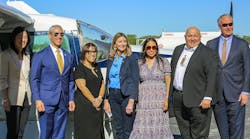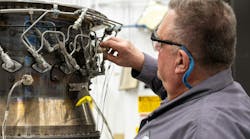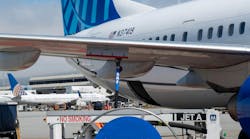Orlando City Commissioners voted Monday to give nearly $1 million over 10 years to a company touting electric small jets that could serve as sky taxis between cities in exchange for creating 143 jobs in the heavily-subsidized Lake Nona development owned by billionaire and Tavistock founder Joe Lewis.
The incentive package earned unanimous approval at the first in-person meeting of the Orlando City Council since March. Five of the seven members sat on the dais separated by Plexiglass.
Mayor Buddy Dyer appeared remotely because he is quarantining after he was exposed to a person who tested positive for COVID-19 last week. Dyer said he doesn’t have any symptoms and tested negative Monday for a second time. He hopes to return to the office Wednesday if he remains symptom-free. City Commissioner Tony Ortiz also appeared remotely.
The new incentive agreement is with the German company Lilium Aviation, which is planning to build a 56,000-square-foot transportation hub in Lake Nona. The hub would create 143 jobs by the end of 2025, with an average salary of $66,451, according to city documents.
The agreement says Lilium wants Florida to be its first U.S. regional market, with Orlando as the hub.
The company manufactures an electric jet that takes off and lands vertically, which acts as a sky taxi between cities. It expects to be fully operational in 2025.
Under the agreement, the city would provide Lilium with a tax rebate of no more than half of its property taxes over 10 years. The maximum value of the incentive is $83,125 annually. The company is required to file in writing each year evidence it’s complying with job requirements.
“Companies looking to come to the city have options,” said Commissioner Jim Gray. “In this one, we expect…140 jobs of about $60,000 and up in salary…and that’s what we need are better-paying jobs.”
Under a separate package of incentives designed to entice commercial builders to meet certain environmental standards, commissioners voted to erase property tax bills for one year for companies who meet the highest threshold. The program is only available for commercial buildings, which must be at least 1,000 square feet in the form of new construction or a new addition. For buildings that reach LEED’s silver status, owners would receive a 50% property tax break, under LEED Gold, a 75% break and under LEED Platinum+, 100% property tax break.
The program has a $2.5 million budget with incentives capped at no more than $250,000 for a single project, and developments receiving other tax incentives from the city aren’t eligible.
“Obviously, there is not that much money in it…it might not be much to one of the 20-story buildings but somebody doing a single-story building, it might put them over the top,” Dyer said.
Sustainability Director Chris Castro said the city is also increasing requirements for its own municipal buildings, now requiring new fire stations, community centers and other structures to be at least LEED Silver.
“When we were analyzing LEED buildings in Orlando, the vast majority are owned by public and academic institutions,” Castro said. “What we’re not seeing is the same type of adoption from the private sector.”
City officials also declined to immediately extend its scooter sharing program to July, instead deferring the decision to a future meeting. Sheehan and Ortiz said they were disappointed some companies weren’t living up to the city’s rules.
“This has just been a nightmare in my district,” said Sheehan, who represents numerous neighborhoods east of downtown. “I am voting a vehement no because these things aren’t safe…I think this is ridiculous and is one of the worst things we’ve ever done.”
Commissioner Regina Hill suggested the city limit the program to one exclusive vendor to help shore up issues.
Without an extension, the program is set to expire Jan. 2, 2021.
Commissioners also had reservations about the return to the council chambers versus all-virtual meetings.
“I do not believe that this is safe or that it sets a good example for community responsibility and safety,” said Commissioner Patty Sheehan, who wore a face covering, plastic face shield and gloves.
Dyer said he would’ve preferred another month of virtual meetings, but Gov. Ron DeSantis decided not to extend his executive order allowing them. Dyer said his staff was trying to allow for members of the public to offer comments virtually at future meetings, but Monday comments had to be offered at City Hall in a separate room.
___
(c)2020 The Orlando Sentinel (Orlando, Fla.)
Visit The Orlando Sentinel (Orlando, Fla.) at www.OrlandoSentinel.com
Distributed by Tribune Content Agency, LLC.



